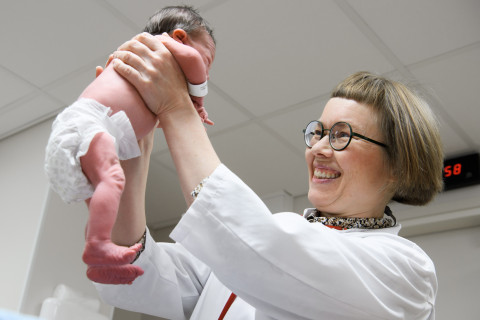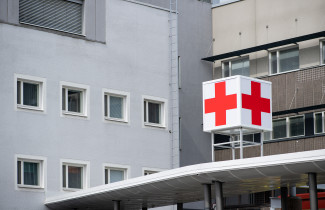Research collaboration between the University of Eastern Finland and the North Savo Wellbeing Services County has been strengthened by the establishment of three part-time (30%), joint professorships in clinical research. Aarno Dietz, Dr. med., Docent of Otorhinolaryngology , and Ulla Sankilampi, MD, Docent of Paediatrics, were appointed in January. Eino Solje, MD, Docent of Experimental Neurology, will be appointed as Associate Professor on the Tenure Track on 1 April 2024.
Jussi Pihlajamäki, the Dean of the Faculty of Health Sciences, says that the new joint professorships of the university and the wellbeing services county are intended to strengthen clinical research as part of the evolving service system.
Research should be integrated into the Daily Operations of Clinics at Kuopio University Hospital
Clinical research refers to medical research conducted on humans. At Kuopio University Hospital, KUH, many patients also participate in scientific research related to their treatment. “However, valuable patient data remains underutilised in several specialties. Research should be more effectively integrated into the hospital’s day-to-day activities,” Aarno Dietz says.
Dietz is the Chief Physician of the Sense Organ Diseases Unit at KUH. In addition to working as an otorhinolaryngologist and as an otologic surgeon, his research focuses especially on the development of diagnostics and treatments related to hearing. As a result, KUH has become the second-largest centre in Finland for cochlear implantation, enjoying high international recognition.
“We currently have three major research projects underway, alongside many smaller ones. In the DigiKuulo (‘Digital Hearing’) project, we are developing a cost-effective method for diagnosing hearing loss and for monitoring rehabilitation outcomes. We are collaborating with the UEF Brain Research Unit on a project funded by the Research Council of Finland, investigating the effects of hearing rehabilitation on information processing and cognition. Additionally, in partnership with the A. I. Virtanen Institute for Molecular Sciences, we are exploring molecular and gene therapy for inner ear diseases in order to develop novel inner ear gene transfer techniques and therapies
“Along with my clinical work, research has kept me busy so far, and the professorship will not change this – quite the opposite. A more general aim is to promote collaboration between Kuopio University Hospital and the University of Eastern Finland.”
According to Dietz, strengthening clinical research in different fields of medicine requires effective quality registries that provide support for practical clinical care and for the collection and analysis of data. “Through systematic monitoring of treatment, we could accurately assess the effectiveness of treatments, which would also provide significant support for clinical decision making and research.”
“Research, development and innovation activities have been included in the wellbeing services county’s strategy, and we’ve seen good proposals on how to enhance research activities. However, it is clear that the current restrains of resources in healthcare poses also significant challenges to clinical research.”

Involvement of the population in research as a strength
Ulla Sankilampi is the Head of the neonatal intensive care unit at Kuopio University Hospital. She is a specialist in paediatrics and a neonatologist, and her research focuses on the early growth and development of infants.
“One could say that in my field, the strengths of clinical research in Kuopio pertain to families with newborns who are keen to participate in studies and also stay on, year after year. In addition, the paediatrics and perinatology staff at Kuopio University Hospital have been very flexible in assisting with research, including helping with the collection of patient samples.”
Sankilampi’s research projects bring together clinical cohort studies and epidemiological register-based studies. For instance, her research group has investigated minipuberty, which is a normal, yet previously poorly understood developmental phenomenon, where the levels of a baby’s sex hormones temporarily rise. “Participants have already been followed up to adolescence.”
An upcoming pilot study will explore the association of minipuberty with immune system development in collaboration with Professor Merja Heinäniemi at the Institute of Biomedicine, who will be responsible for the single-cell analysis of the samples. “This is a good example of how researchers engaged in basic research, or other collaborators, can contribute new methods and expertise to research questions that emerge from clinical work.”
Early, foetal and infant growth are associated with lifelong health. In projects using Finnish register-based data and focusing on early childhood growth, Sankilampi’s research group aims to examine growth patterns associated with good long-term health in both preterm and full-term infants. Additionally, clinical cohort studies are conducted to identify the mechanisms underlying growth disorders in premature infants.
“Currently, a major challenge is to inspire physicians to engage in research. Young physicians and medical students aren’t necessarily keen to commit to a doctoral research project for several years, because researcher salaries are not competitive compared to other job opportunities available to young physicians.”

Patient rights as part of clinical research
Eino Solje leads the Brain Research Unit at the University of Eastern Finland, which provides research and analytics services for academic research groups and the pharmaceutical industry. He also works at the KUH Neuro Center as a neurologist responsible for the diagnostics and treatment of neurodegenerative diseases, and he leads a research group focused on frontotemporal lobar degeneration and early-onset dementia. As an Associate Professor in Clinical Research, he aims to further streamline collaboration between the hospital and the university.
“Collaboration with the Neuroscience Research Community (NEURO RC) is already close, and the same patient samples could flexibly be used in several studies. This way, a relatively small number of patients can yield diverse new scientific knowledge, which is also a recurring wish among patients.”
Solje’s own research is focused on finding new biomarkers and tools for diagnosing neurodegenerative diseases. “Better and more accurate diagnostics is a prerequisite for finding a cure for these diseases.”
In particular, several EU projects related to the diagnosis of Alzheimer’s disease are currently underway at the Brain Research Unit.
Solje has built extensive, interdisciplinary collaboration between basic researchers and various specialties within the hospital. A new initiative even by global comparison is, in collaboration with scholars of law, the piloting of a law clinic for people participating in clinical research. “We aim to analyse legal and societal issues related to illness, such as factors related to social benefits. At the same time, we strive to develop an objective method for assessing whether a patient is capable of making decisions related to their treatment, finances, or other legal matters.”
According to Solje, physicians are nowadays increasingly interested in research, possibly because it earns them points when applying for residency. “In general, attitudes towards research are more positive. Currently, there are more than a dozen doctoral researchers in my own group, and even more of those who’d like to join.”
“I believe we could be braver in communicating our excellence to international funders, as we are conducting world-class research in many fields here. Modesty is traditionally held in high regard in Finland, but it doesn’t pay off when applying for funding,” Solje says.
For further information, please contact:
Professor Aarno Dietz, aarno.dietz(a)pshyvinvointialue.fi, https://uefconnect.uef.fi/en/person/aarno.dietz/
Professor Ulla Sankilampi, ulla.sankilampi(a)pshyvinvointialue.fi, https://uefconnect.uef.fi/en/person/ulla.sankilampi/
Associate Professor Eino Solje, eino.solje(a)uef.fi, https://uefconnect.uef.fi/en/person/eino.solje/



